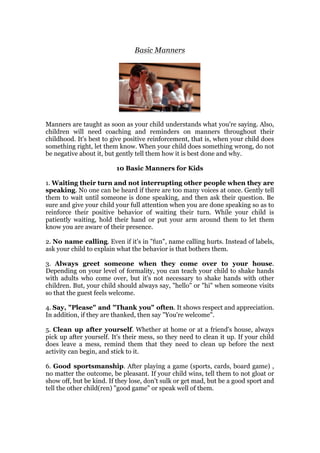Basic manners for kids
•
1 like•33 views
Manners are important lessons that should be taught to children from an early age and reinforced consistently throughout their development. The document outlines 10 basic manners that parents can teach their children, including waiting their turn, not name-calling, saying please and thank you, cleaning up after themselves, being gracious whether they win or lose, taking compliments politely, holding doors for others, allowing others to exit or enter first, and respecting differences in others. Positive reinforcement should be given when children display good manners, and corrections should be made gently while explaining why certain behaviors are best.
Report
Share
Report
Share
Download to read offline

Recommended
More Related Content
What's hot
What's hot (20)
Similar to Basic manners for kids
Similar to Basic manners for kids (20)
Manners Children Should Know Before Their Schooling Begins

Manners Children Should Know Before Their Schooling Begins
Name___________________________________________ .docx

Name___________________________________________ .docx
Recently uploaded
The Author of this document is
Dr. Abdulfatah A. SalemOperations Management - Book1.p - Dr. Abdulfatah A. Salem

Operations Management - Book1.p - Dr. Abdulfatah A. SalemArab Academy for Science, Technology and Maritime Transport
Recently uploaded (20)
The impact of social media on mental health and well-being has been a topic o...

The impact of social media on mental health and well-being has been a topic o...
Operations Management - Book1.p - Dr. Abdulfatah A. Salem

Operations Management - Book1.p - Dr. Abdulfatah A. Salem
The Benefits and Challenges of Open Educational Resources

The Benefits and Challenges of Open Educational Resources
slides CapTechTalks Webinar May 2024 Alexander Perry.pptx

slides CapTechTalks Webinar May 2024 Alexander Perry.pptx
MARUTI SUZUKI- A Successful Joint Venture in India.pptx

MARUTI SUZUKI- A Successful Joint Venture in India.pptx
UNIT – IV_PCI Complaints: Complaints and evaluation of complaints, Handling o...

UNIT – IV_PCI Complaints: Complaints and evaluation of complaints, Handling o...
aaaaaaaaaaaaaaaaaaaaaaaaaaaaaaaaaaaaaaaaaaaaaaaaaaaaaaa

aaaaaaaaaaaaaaaaaaaaaaaaaaaaaaaaaaaaaaaaaaaaaaaaaaaaaaa
Basic manners for kids
- 1. Basic Manners Manners are taught as soon as your child understands what you're saying. Also, children will need coaching and reminders on manners throughout their childhood. It's best to give positive reinforcement, that is, when your child does something right, let them know. When your child does something wrong, do not be negative about it, but gently tell them how it is best done and why. 10 Basic Manners for Kids 1. Waiting their turn and not interrupting other people when they are speaking. No one can be heard if there are too many voices at once. Gently tell them to wait until someone is done speaking, and then ask their question. Be sure and give your child your full attention when you are done speaking so as to reinforce their positive behavior of waiting their turn. While your child is patiently waiting, hold their hand or put your arm around them to let them know you are aware of their presence. 2. No name calling. Even if it's in "fun", name calling hurts. Instead of labels, ask your child to explain what the behavior is that bothers them. 3. Always greet someone when they come over to your house. Depending on your level of formality, you can teach your child to shake hands with adults who come over, but it's not necessary to shake hands with other children. But, your child should always say, "hello" or "hi" when someone visits so that the guest feels welcome. 4. Say, "Please" and "Thank you" often. It shows respect and appreciation. In addition, if they are thanked, then say "You're welcome". 5. Clean up after yourself. Whether at home or at a friend's house, always pick up after yourself. It's their mess, so they need to clean it up. If your child does leave a mess, remind them that they need to clean up before the next activity can begin, and stick to it. 6. Good sportsmanship. After playing a game (sports, cards, board game) , no matter the outcome, be pleasant. If your child wins, tell them to not gloat or show off, but be kind. If they lose, don't sulk or get mad, but be a good sport and tell the other child(ren) "good game" or speak well of them.
- 2. 7. Take compliments courteously. If someone praises your children, teach them to be gracious and say, "thank you", and avoid putting themselves down or pointing out flaws. 8. Opening doors for others. When going into buildings, allow elders to go first and open the door for them. When preceding others into a building, don"t let the door slam in the face of those behind, but hold the door until the person behind can grab it. Also teach your children that if someone holds the door for them, then remember to say "thank you". 9. Exiting/Entering etiquette. Elevators: allow those in the elevator to exit first before entering the elevator. Same with buildings or rooms - if someone is exiting the building or room through the same door you are entering, let them exit first. 10. Respect differences. When people do things differently from your family because of diversity in culture, race, or religion, then teach your child respect. Point out how interesting it is or how different families do different things. Families have their own traditions or rituals and it is important and has meaning for that family. " [taken from : http://www.drdaveanddee.com/manners1.html]
